Environmental Effect of Oil Spillage and Cleanup on the Marine Environment in Selected Niger Delta Communities
Oyintare Brisibe1, Okechukwu Julius Anyanwu2*, Charles Odeyovwi Okorefe2, John U Eru2 and Vianana Bolouowe Michael1
1Faculty of Environmental Management, Nigeria Maritime University of Nigeria, Nigeria
2Faculty of Transport, Nigeria Maritime University of Nigeria, Nigeria
Submission: September 5, 2023;Published: September 20, 2023
*Corresponding author: Okechukwu Julius Anyanwu, Faculty of Transport, Nigeria Maritime University of Nigeria, Okerenkoko, Warri South L.G.A of Delta State, Nigeria
How to cite this article: Oyintare B, Okechukwu Julius A, Charles O O, John U E, Vianana B M. Environmental Effect of Oil Spillage and Cleanup on the Marine Environment in Selected Niger Delta Communities. Int J Environ Sci Nat Res. 2023; 32(4): 556347. DOI 10.19080/IJESNR.2023.32.556347
Abstract
Oil spills have been recurrent and impacting damaging effects on the environment particularly within the oil-producing region. This research examines environmental effect of oil spillage and cleanup on the marine environment in selected Niger Delta communities. It seeks to assess how the federal government and the oil firms manage oil spill incidents and the degradation of environment brought about by the oil spillage. The results of the research have identified gaps and need for improvement to manage oil spills incidents to protect the environment. It has uncovered the need for the Nigerian environmental laws and policy to be updated. It is proposed that there is need for the government to set out strict obligation for degradation of the environment. The oil generating organisations in Nigeria should comply with international best practices in exploitation of oil and the Nigerian government should embrace different suitable technology for oil spill control as well as involving inhabitants of the Niger delta region in the management of oil spill.
Keywords:Oil; Spill; Environment; Marine; Niger delta
Introduction
Oil spillage is a global issue that keeps occurring since the discovery of crude oil, which was part of the industrial revolution. Through human activities, the total spillage of petroleum into the oceans, seas, and rivers is estimated to the range 0.7-1.7 million tons per year [1]. Oil spills have posed a major threat to the environment of the oil-producing areas, which if not effectively checked can lead to the total destruction of ecosystems [2].
One activity that has aroused considerable interest across the globe and especially in oil producing countries like Nigeria especially in the Niger Delta region is crude oil exploration. Crude oil exploration is one of such activity that can affect the environment negatively especially when accidents occur in operations resulting to spillage of oil. According to Egwu [3], one of the factors that cause discharge of oil to the environmental is the unethical engineering operations practiced by the industries involved [4].
The Niger Delta is among the ten most important wetland and marine ecosystems in the world. The oil industry located within this region has contributed immensely to the growth and development of the country which is a fact that cannot be disputed but unsustainable oil exploration activities have rendered the Niger Delta region one of the five most severely petroleum damaged ecosystems in the world. Studies have shown that the quantity of oil spilled over 50 years was at least 9-13 million barrels, which is equivalent to 50 Exxon Valdez spills [2].
The Exxon Valdez oil spill which occurred in Prince William Sound, Alaska, on March 24, 1989 with an estimated crude oil spill of 260,000 to 750,000 barrels and more recently the BP deep-water horizon oil spill on 20 April 2010 in the Gulf of Mexico caused by the explosion and sinking of the Deepwater Horizon oil rig are some examples of oil spill effect. It caused an oil discharge for 87 days with an estimate of the total discharge at 4.9 million barrels, [3]. As a result of lessons learnt from these and other oil spills, the prevention, response and management of oil spills is being given top priority worldwide especially in oil producing countries such as Nigeria in order to circumvent the economic and environmental hazards of an oil spill.
The recent Ogoni oil cleanup exercise due to an oil spill by Shell BP has its negative effect due to the harmful chemicals used in the process [5]. Spillage of oil from exploration activities has lead to massive environmental degradation in the past decades. Such problems include contamination of water bodies, danger to aquatic life, destruction of flora and farmlands which includes resort centers, destruction of properties, loss of lives and many more [6].
In addition, oil spillage and cleanup impacts to the environment can lead to unwanted migration of people as well as aquatic organisms from the areas. According to Nwilo & Badejo [7], the consequences of oil spill and cleanup is far-reaching as it impacts negatively on the economy of a region, pollutes water thereby health of the local community, and contaminates soils rendering it futile for farming apart from the reputation of the oil companies involved.
Literature Review
Egbe & Thompson [8] grouped the various causes of oil spills
under eight headings as follow:
1. Blow Outs: Oil well blow out occurs when the well is not
kept under control that is to behave in such a way that the
hydrostatic mud head counter balances the formation pressure
and prevents the formation fluid from entering the well
formation during drilling operations.
2. Sabotage: When the cause of spill is mischievously deliberate
and not accidental.
3. Corrosion: When the cause of leakage is rusty equipment.
4. Equipment Malfunction: Breakdown and failure of
equipment are often the most frequent causes of separator
and tank over-flow.
5. Operations / Maintenance Error: Bad oil operation practices
like untrained personnel and lack of maintenance of the
equipment.
6. Natural causes: Oil spillage: Oil spill could occur as a result
of natural causes; they are causes which are not manmade
or induced thus, occurring without any fault of man (Examples
motion of tectonic plates, rain, flood, etc.).
7. Accident from third party.
Olukayode [9] identified the physical presence of the oil industry in Nigeria as so great and has resulted in a lot of actions in the upstream sector which has harmful effects on ecosystem stability and local biodiversity that the peoples‘ livelihoods depend upon. His work provided a general idea of environmental issues in the oil and gas industry in Nigeria with specific focus on oil spillage, he highlighted the best approaches to attaining high environmental performance in the oil and gas industry in Nigeria [10]. He used a comparative study approach on reports on the oil and gas industry report from Shell and Nigerian National Petroleum Company. He observed that oil spills occur more as a result of vandalization than rupture during operations.
Many scholars have specifically examined the effects of oil pollution on the environment both in Niger Delta and in West African coastal regions. Some of these studies concentrated on the identification of sources and their potential effects on the marine environment, ecosystem, etc, and other related papers have also dealt on marine pollution and the various sources. Some of these papers include the identification of identifying sewage, industrial effluents, plastics that float on water and abandoned objects other than vessel-based ones, as sources carried out by Elenwo & Akankali [11] and Okuma [12] on the effects of Marine Pollution on Nigerian Coastal Resources. From their work, the effects of these sources on the marine environment are degradation and thermal pollution which adversely affects the ecosystem, eutrophication from untreated waste that destroys marine organisms and plants and cause the depletion of dissolved oxygen that adversely affects Biochemical Oxygen Demand (BOD). Uyigue & Agho [13] and Badejo & Nwilo [14] in their separate research contributed to issues such as health and economic implications of oil spill, severe environmental damages, loss of mangrove forest, and other social factors as effect of spill-induced in Nigeria with particular reference to Niger Delta. Elenwo, & Akankali [11] identified sewage, industrial effluents, plastics floating on water and neglected objects other than vessel-based ones, as sources. According to them, the specific effects of these sources on the marine environment include degradation and thermal pollution which adversely affects the ecosystem, as well as eutrophication arising from untreated waste which can destroy sea animals, plants and causing the depletion of dissolved oxygen that affects Biochemical Oxygen Demand (BOD).
Kadafa, Zakaria & Othman [15] appraised the relevant laws in their studies organizational and institutional framework of oil spillage and pollution management in Nigeria (including international agreements) enacted by the government of Nigeria since 1963 which aim to mitigate the incidence of oil pollution. In addition, they also examined the relevant agencies established to implement procedures on oil pollution and management during oil prospecting/production activities. Also, Onyema et al. [10] posited that the provisions of Environmental Guidelines and Standard for the Petroleum Industry (EGASPIN) should be followed strictly to facilitate effective management of offshore E&P wastes in Nigeria as it is not in line with contemporary international standards as most of the parameters tested and analyzed are not within limit.
Nwokedi, Moses, Ibe & Onyemechi (2017) in their work on Economic Implications of Marine Oil Spill to Nigeria assert that they study adopted the natural resources damage assessment model, using data collected from the Nigerian National Petroleum Corporation (NNPC), the Organization of Petroleum Exporting Country (OPEC) and National Bureau for Statistics (NBS), they concluded that within the period covered in their study, 1984- 2012, the Nigerian economy lost an estimated 3,928,260,196 naira revenue due to oil spill which is not inclusive of remediation cost, third party costs and impact on the environment.
Also, that total of 1184 oil spill incidences led to the spill of total sum of 1,301,397.2 barrels of oil over the 29 years period and that average of 1099.153 barrels was lost per spill incident with an average economic loss of 3,317,787.3 naira per spill incident. Elei (2014) carried out research work on Illegal oil trading in Nigerian maritime industry and its impacts on the economy. He posits that most of the oil spill incidences are attributable to accidental discharge, others are operational discharge. He proved that illegal oil trading in the Niger Delta also contributes to oil spill leading, to economic losses and pollution of the Nigerian marine environment. Apart from the economic implications of oil spill, which is the central focus of this study, severe environmental damages, loss of mangrove forest, depletion of fish population, contamination of domestic and industrial sources of water, prevalence and promotion of spill-induced diseases and ill health, among are key observable impacts of oil spill, Michael & Hui [16] also provided these prove.
In view of the focus of this research work, the above reviews are limited and most of their findings are to a certain extent instructive and informative. For instance, the studies have established the oil pollution from various sources, the negative impacts on marine resources which affects the economy of littoral states [11] and (Umo, Nitonye 2015). Olukayode [9] identified the physical presence of the oil industry in Nigeria as so great and has resulted in a lot of actions in the upstream sector which has harmful effects on ecosystem stability and local biodiversity that the peoples’ livelihoods depend upon. This present study would specifically look at some communities in Warri south LGA of Delta State whose predominate occupation is fishing and farming, hence the need to explore the immediate and later effect of oil spill and clean up exercise in this area.
Materials and Methods
The applied model in this research implements both qualitative and quantitative data. This model was used in light of the fact that the research included exploring participants’ opinion towards issues of oil spill considering the causes and impact as well as the management of oil spill in the region. Qualitative data gathered were broken down and the quantitative information investigation comprised of enlightening details including associations amongst variables. The fusion of both research strategies gives a clearer understanding of the subject matter such as the causes, impacts and management of oil spillage in the Niger delta region of Nigeria.
The population of interest covered in the research involved affected community population both male and females and oil company workers with workplace in the region. The communities include the Kurutie, Okerenkoko, Oporoza, Ebimo, Ogbijaw, Gwangwe, etcetera, all in Warri south LGA.
The questionnaire was designed to meet the research objectives
and the. The questionnaire consisted of the following sections:
1. Individual and occupation details.
2. Oil spill Awareness: these questions were designed to
know the knowledge of oil spill (participant)
3. Causes and impact of oil spill: this aspect of the questionnaire
is designed to identify the causes of oil spill and the
impacts to the community.
4. Management of oil spill: the questions of this aspect was
to identify the effectiveness of the management approach of
oil spill by the locality.
5. Comments: this section is designed for respondents to
make any comment or contribution for the research.
A total of 400 questionnaires were dispensed to the inhabitants of the Niger delta region in Nigeria. Out of the 400 questionnaires that were distributed, 376 were returned. Out of the amount returned, 6 were incomplete and 20 were blank indicating that the individual might have decided not to participate while 350 were fully completed.
Table 1 gives a description of the attributes of the participants. The profile of the 350 individuals demonstrates that all respondents have stayed in the Niger delta region for at least two years.
72% (n=252) out of the aggregate respondents were male and 28% (n=28) were female. 32% (n=112) were matured individuals between 18 and 25 years of age; 60% (n=210) were between 26 and 35 years of age; 8% (n=28) were between 36 and 45 years of age; none was recorded for 46 years and over. As shown in table 1, a large volume of response obtained shows that 66%(n=231) of the total respondent’s fishers and farmers. This is closely followed by the trading/business with 14% (n=49), while wage earners are 10%(n=35) and other types of jobs 10%(n=35) respectively. These identified job types are in accordance with the literature as common job types of majorities of the Niger delta region inhabitants. The table also shows the education qualification and current work status of the respondents.
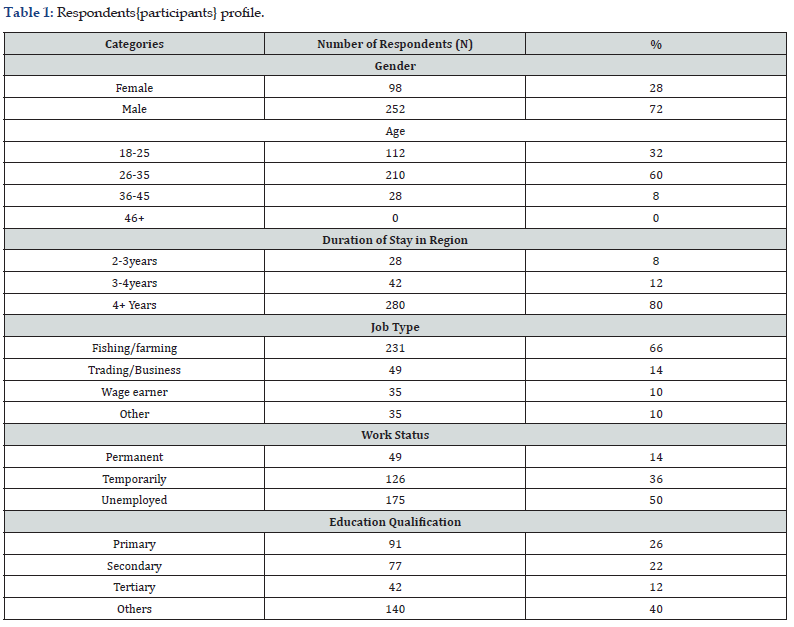
Awareness
The question in this sub sub-section is to ascertain the knowledge or understanding of oil spill incidents of the respondents. This is to identify whether the respondent is qualified to complete the survey for the research.
Knowledge of oil spill
From the survey responses gathered, all respondents have knowledge of oil spill. 70% of the respondents indicated that they have a good knowledge of oil spill, while 20% have average knowledge of oil spill and 10% have just basic knowledge of oil spill as can be seen in Figure 1 below. This was necessary as to justify that the respondent have understanding of the subject and questions in the survey to be answered.
Additionally, the survey went further to find out how many respondents have experienced or witnessed oil spill incident. The outcome of this particular question was shocking as all respondents (100%) indicated that they have experienced oil spill occurrence. The interviews confirmed this as normal to the inhabitants in the region. This is because most of the pipelines for transporting extracted crude oil are suited along residential areas or beside the roads that can be easily sighted by people. As such it is easy for one to see oil spill occurring when incidents such as pipeline leakage occurs (Figure 2).
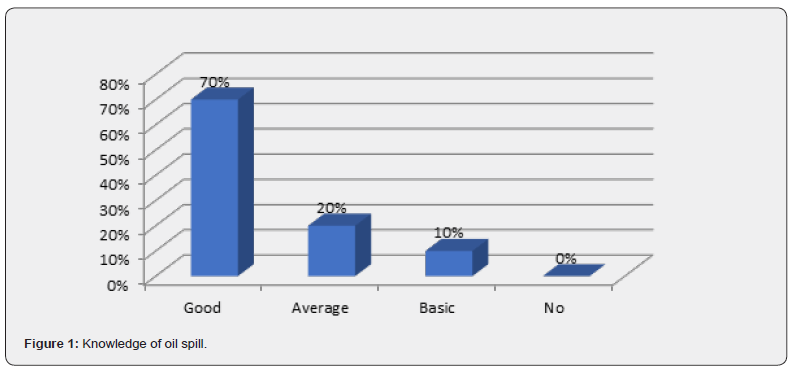
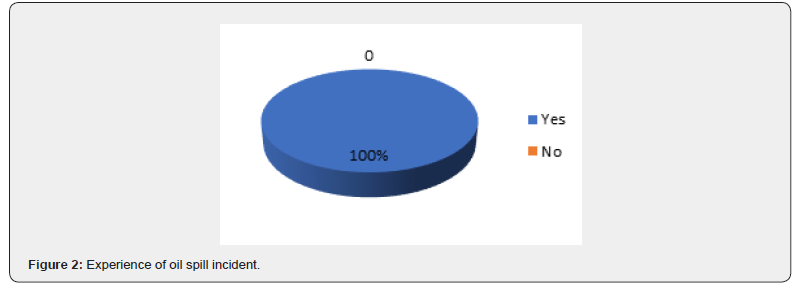
Number of Oil spill observed within the last 5 years (from 2018 to 2022)
This section seeks to identify the amount and then the rate of oil spill occurrence in the Niger delta region (Figure 3).

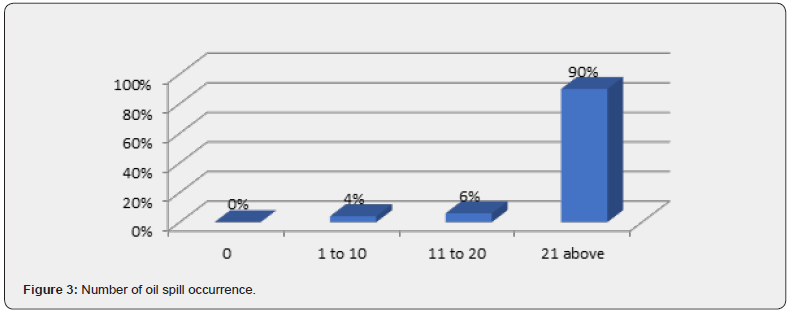
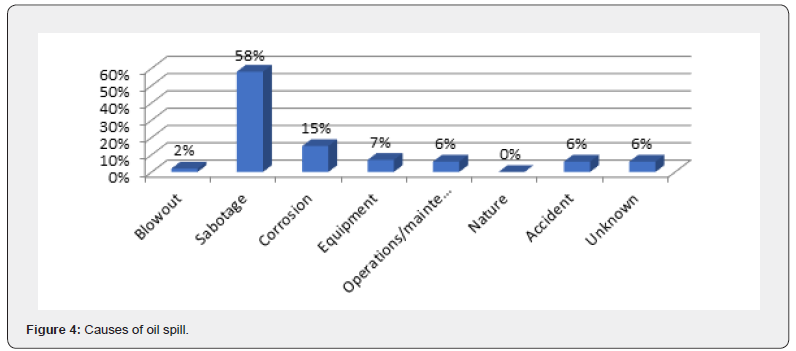
From the graph above 4% of the respondents indicated they have experienced 1 to 10 incidents within five years in the Niger delta region, 6% indicated that they have experienced about 11 to 20 oil spill incidents in their period in the Niger delta region while an enormous percentage of 90% indicated that they have experienced above 21 oil spill incidents within five years in the Niger delta. These results from the questionnaire survey can be verified from a data obtained from the Department of Petroleum Resources of Nigeria as can be seen below in (Figure 4) indicating the amount of oil spill occurrence in the Niger delta region in a particular period from 2019 to 2022. The outcome corresponds with finding in this research as respondents noted that oil spill incidents are enormous from the survey. The interview section also obtained same finding as the interviewees concluded that the rate of oil spill incidents in the region can be classified as high (Table 2).
Causes of oil spill
The research on this note seeks to identify the cause of oil spill in the Niger delta region especially regarding the amount and rate of oil spill occurrence in the region.
From Figure 4 above, it was gathered that the major cause of oil spill in the Niger delta region is the act of pipe sabotage. 58% of the respondents attributed the major cause of oil spill incident to Sabotage on a scale of 1 to 8 where 1 is the least cause of oil spill incident and 8 is the highest cause of oil spill incident in the region. The result also agreed with the literature as Egbe & Thompson [9] grouped sabotage as one of the causes of oil spillage in Nigeria oil producing area
Factors responsible for the cause of oil spill
As gathered from the literature, the causes of oil spill are due to several reasons as such the survey seeks to identify the reasons for control where possible. The question for this section was grouped into 7 subjects to identify the reason or factors responsible for the cause of oil spill in the Niger delta region.
From Figure 5, the research gathered poverty to be the major factor responsible for the cause of oil spill. 45% of the respondents of the region inhabitants attributed the cause of oil spill to poverty while 16% and 14% of the respondents respectively indicated policy and technology as responsible factors leading to the cause of oil spillage. 4% of the respondents indicated competency in terms of personnel to conduct oil and gas operations in the area, while 5% indicated Negligence by responsible parties of the oil and gas sector in the region, and 10% attributed the cause to Orientation of people. From the interview section, Poverty was also gathered as the leading factor responsible for oil spill.
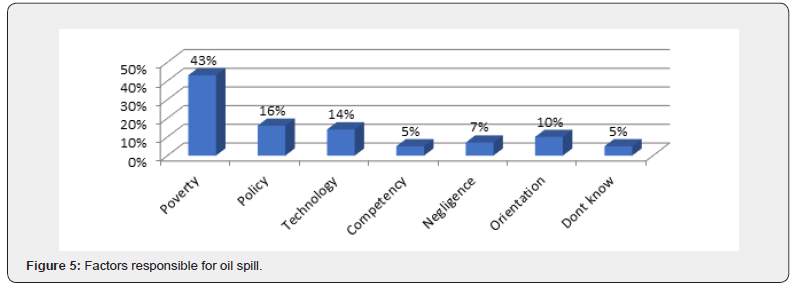
Impact of oil spill and oil spill cleanup
Oil spill cause pollution to the environment in several ways such as contamination of water or land pollution and can also lead to illness due to its chemical composition. This section of the questionnaire seeks to find out the impact of oil spill in the region, how it affects the inhabitants of the region and to what degree.
Amount of Inhabitants affected by oil spill
From the survey as detailed below in Figure 6, all respondents indicated that they have been affected by oil spill. This goes to mean that majority of the region inhabitants feels the consequence of oil spill in the region.
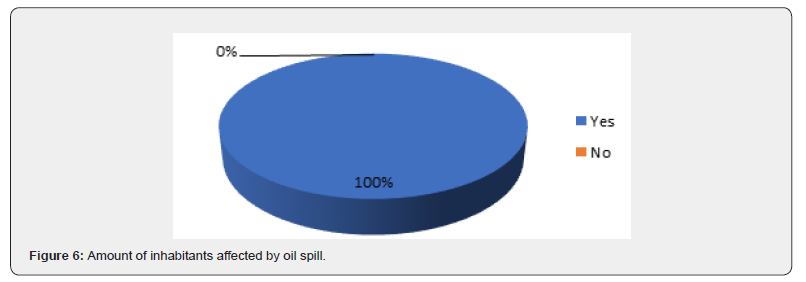
As seen from Figure 6, the survey went further ahead to find out if the region has been affected in one way or the other by oil spillage.100% of the respondents indicated that there have been in one way or the other affected by oil spillage incident.
Main areas affected by oil spill
As gathered from the above sub-section in Figure 7, all respondents indicated to them felt the consequence of oil spill. The survey then went further to find out what has been affected mainly in the area and life of the inhabitants. The outcome is detailed in the graph below (see Figure 8).
From Figure 7, majority of the respondents indicated that the environment has been mainly affected. This is obvious as majority of the habitants in the Niger delta region are farmers and fishermen. More so this is evident in the literature review where Badejo & Nwilo [17] stated 48% of the occupation in the Niger delta is agriculture and fishing, this in turn affects the economy of the region. Businesses like restaurants and hotels face decline in profits as oil spill incidents leads to low turn up of tourists. This is due to the pollution of the beaches and reserves from the oil spill. This coincides with the literature research from ITOPE (2009), which noted that oil spill pollution of land and water leads to interference and loss of recreational activities such as diving and sporting events. Businesses that make use of the rivers and sea for their normal operations can also be adversely affected by the oil spill. Health of the inhabitants was also indicated has been affected by oil spill but not as the major concern as discovered by this research.
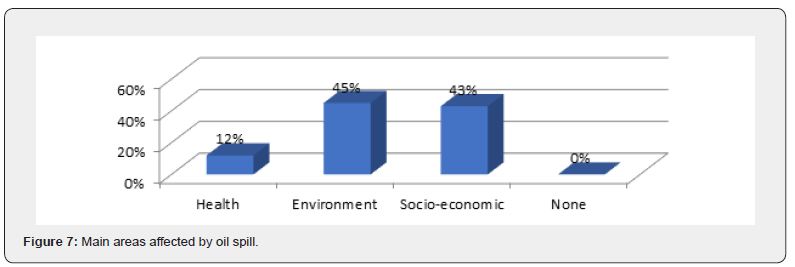

Duration of oil spill impact
Oil spill impact can be quite devastating to the environment, economy and health of persons in a particular region. In this section, the research seeks to find out the duration of the oil spill impacts to the Niger delta region for management improvements. From the survey, it was gathered from majority of respondents that the consequence of oil spill incidents in the region can take above six months on most occasion before controlled while only 1% indicated it takes between three (3) to six (6) months to stop or control oil spill impacts and none indicated less than 3 months.
From this section, it can generally be seen that majority of the respondents have been affected by the impacts of oil spill and these impacts can be rated high due to the quantity of barrels spilled and rate of oil spill incidents and even more the duration it takes to control majority of incident/impact. The oil spill incident has affected the environment, socio-economy and health of person residents in the region but has mainly affected the regions environment.
Conclusion and Recommendations
Oil spillage has had a major negative impact on the citizens of Nigeria, and the economy as a whole. An illustration of this can be seen in the friction caused between the oil producing/servicing companies and resident communities resulting in frustrations, finger pointing, clashes, general resentment and mistrust.
The cause of oil spill can lead to very disastrous situation
as such should be treated as national emergency by the Nigerian
government whenever it occurs. Not just because this is the
case in other oil producing zones of the world but because it is
the responsible thing to do. Now, the Nigerian oil industry is to a
large extent dependent on foreign experts, international oil companies
and other foreign organizations for spill management. This
approach cannot add local content value with regards to the development
and transfer of relevant technology and only degrades
the country’s ability to deal with oil spills promptly and effectively.
Well-developed spill management must involve expanded
local knowledge of spills and a clear national spill contingency
plan, provision of trained personnel and massive investment in
response/clean up assets, equipment and technology.
a) The public or inhabitants (Farmers, Traders, women
groups, school children and the youths) of the Niger delta
should be enlightened on the negative effects of pipeline sabotage
on the.
b) Adequate technologies for oil spill should be embraced
without delay by oil operators in the Niger delta region.
c) The Nigerian government should continuously employ
and train personnel at all levels for oil spill emergencies.
d) The oil organization should have free emergency national
numbers in place this way the habitants in the region can
call when there is an event of an oil spill.
e) The emergency responses procedures should be designed
to swiftly take measures to protect the safety of the
public, employees and the environment.
f) Without delay the Nigerian Government should implement
effective national oil spill contingency plan at State and
Federal levels for effective control of oil spill incidents in the
Niger delta region.
References
- Onyemechi C, Nwokedi TC, Okeke O, Igboanusi C, Odumudu CU, et al. (2017) A business ecosystems model for harnessing Nigeria’s Ocean economy. Journal of Traffic and Transportation Engineering 5: 279-284.
- Adesina TO (2014) Control of oil Pollution and the Assessment of Its Legal Framework: A B.Sc A Project, Faculty of Law, University of Lagos
- Egwu SA (2012) Oil spill Control and Management. Petroleum Technology Development Journal (1): 1595-9104.
- Anyanwu,O. (2014) Maritime Tanker Accident on Coastal Areas in Nigeria. GJRE-G: volume XIV issue II version 1
- Onwuegbuchunam DE, Ebe TE, Okoroji LI, Essien AE (2017) An Analysis of Ship-Source Marine Pollution in Nigeria Seaports. Journal of Marine Science and Engineering. J Mar Sci Eng 5(3): 39.
- Badejo OT, Nwilo PC (2009) Management of oil spill dispersal along the Niger Delta region.
- Nwilo PC, Badejo OT (2008) The Impacts of oil spills along the Nigerian Coast. Department of Surveying and Geoinfomatics, University of Lagos. Nigeria.
- Egbe E, Thompson D (2010) Environmental Challenges of Oil Spillage for Families in oil producing communities of the Niger Delta region. JHER 13: 24- 34.
- Olukayode AA (2015) Assessment of oil spillage and its control in the oil and gas industry in Nigeria. Thesis project, postgraduate studies, Ahmadu Bello University, Zaria.
- Onyema HK, Iwuanyanwu JO, Emeghara GC (2015) Evaluation of Some Physicochemical Properties and Heavy Metals in Post-Treated Produced Water from Offshore Locations in the Niger Delta Area, Nigeria. Journal Appl Sci Environ Manage 19(4): 767-770.
- Elenwo EI, Akankali JA (2015) The Effects of Marine Pollution on Nigerian Coastal Resources. J Sustain Dev Stud 8(1): 209-224.
- Okumx K (2016) Long term Transformation of the economy: Economy Nexus in Japan: A Historical Analysis of Environmental institutions and growth regimes based on the regulation tiers. Evolutionary and Institutional Economics Reviewed Journal 1(1): 217-237
- Uyigue E, Agho M (2007) Coping with Climate Change and Environmental Degradation in the Niger-Delta of South Nigeria. Benin. Community Research and Development Centre (CREDC).
- Badejo OT, Nwilo PC (2004) Management of oil spill disposal along the Nigeria Coastal Areas. ISPRS Congress 2004, Istanbul, Turkey.
- Kadafa AA, Zakaria MP, Othman F (2012) Oil Spillage and Pollution in Nigeria: Organizational Management and Institutional Framework. Journal of Environ Earth Sci 2(4): 22-30.
- Micheal F, Hui W (2015) Compensating victims of a European deepwater horizon accident: OPOL revisited. Marine Policy 62: 25-36.
- Nwilo PC, Badejo OT (2008) The Impacts of oil spills along the Nigerian Coast. Department of Surveying and Geoinfomatics, University of Lagos. Nigeria.






























